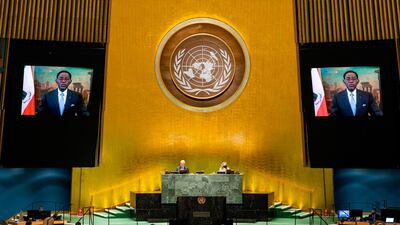African nations have called for $300 billion in fiscal measures to help economies survive the coronavirus pandemic.
In speeches at the UN's 75th General Assembly on Thursday, the heads of state outlined the dire situation facing them, with one describing Covid-19 as the “fifth horseman of the apocalypse”.
Africa's 54 countries estimate they need $100bn a year in support for the next three years, saying it is a fraction of the trillions of dollars some richer countries are using to revive their economies.
As some world powers go their own way during the crisis, what Zimbabwean President Emmerson Mnangagwa called “the blind pursuit of narrow interests”, the African nations that make up more than a quarter of UN members are leaning into multilateralism.
Reminding fellow leaders of what brought the UN to life 75 years ago, President Teodoro Obiang of Equatorial Guinea said the victors of the Second World War “had conflicting interests but were able for a moment to unite, and were able to place the salvation of the world above their own interests".
Debt cancellation is needed to free up more resources to tackle the crisis, the heads of state said.
Africa is entering its first recession in a quarter of a century, stalling years of success in which several countries joined the world's fastest-growing economies.
The president of one, Ivory Coast, called for the extension of a G20 debt moratorium beyond the end of this year and special drawing rights at the International Monetary Fund.
“I call on all Africa’s partners to take bolder measures,” Alassane Ouattara said.
Mr Ouattara said the fight against Covid-19 and its economic effects represented 5 per cent of his country’s GDP.
Reforms of Bretton Woods institutions such as the IMF and World Bank might be needed to “usher in a fairer international order”, Gabon President Ali Bongo Ondimba said.
President Roch Kabore of Burkina Faso recalled the UN chief this year warning against the “four horsemen of the apocalypse”, including geopolitical tensions and climate change.
“Unfortunately, less than two months later, a fifth horseman of the apocalypse – very destructive, the coronavirus – has appeared,” Mr Kabore said.
In another briefing on Thursday, a World Health Organisation official said only 51 per cent of health centres in sub-Saharan Africa had basic water services.
In their UN speeches, delivered online in video messages because of the pandemic, some African heads of state acknowledged that they must also do more.
The Ivory Coast leader pledged that his country would invest $3bn in its health system, from 2021 to 2025.
Health experts say Africa has fared far better than the dire predictions early in the pandemic.
There have been more than 1.4 million confirmed cases on the continent of 1.3 billion people, and the WHO said the rate of new cases in sub-Saharan Africa steadily declined for the past two months.
Experts say possible factors include Africa’s relative youth, the later arrival of the virus and swift lockdowns.
The relatively low number of international air links has also protected the continent but hurt the delivery of life-saving goods such as childhood vaccines.
“The pandemic has reversed our gains" on many fronts, including the strengthening of democracy, said President Adama Barrow, of the Gambia.


